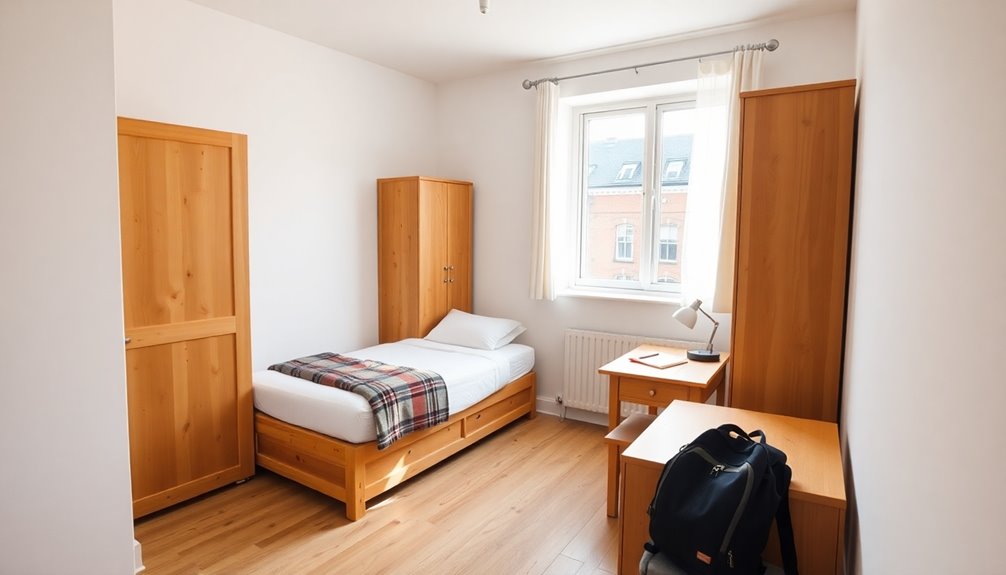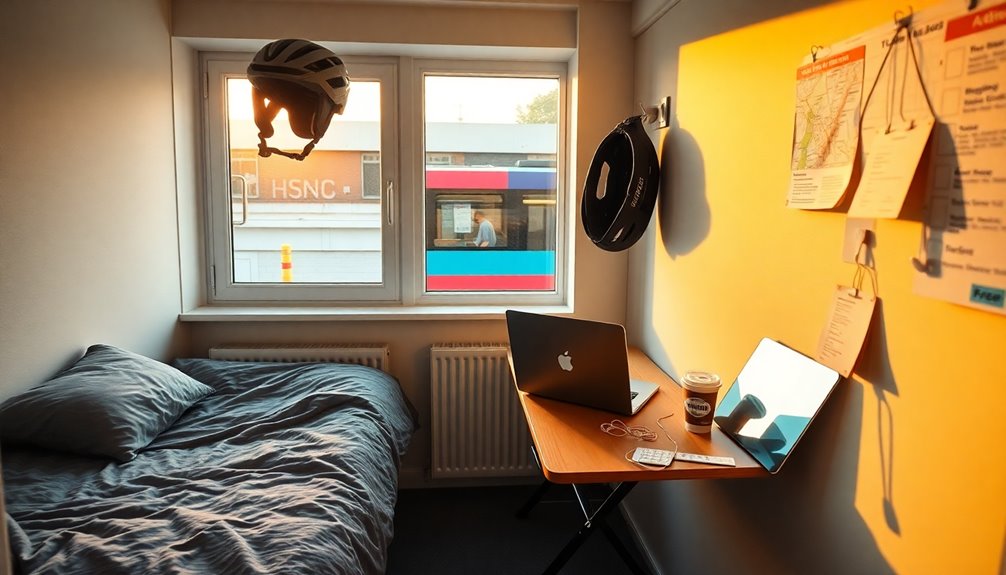
You can find clean, budget student rooms near Irish English schools for about €300–€600 a month by choosing shared flats, homestays or short-term sublets. Look for bills-included listings and neighborhoods within walking distance to cut transport costs. Split utilities with reliable flatmates and aim to keep rent at 30–40% of your funds. Plan meals, use student discounts and compare utility rates. Keep a buffer for deposits and unexpected costs — more tips and budgeting breakdowns follow.
Understanding Living Costs Around Irish English Schools
When you’re budgeting for student accommodation near Irish English schools, start by mapping out the main monthly costs: rent, utilities, groceries, transport and any required study materials or insurance. You’ll want a simple spreadsheet to track living expenses and run a clear cost comparison between neighborhoods and housing options. Include one-off setup fees, deposits and a buffer for unexpected repairs or medical needs so you feel secure. Factor in safer, well-lit routes for commuting when estimating transport costs; sometimes a slightly higher rent near campus reduces taxi or late-night expense risks. Compare grocery prices at local markets versus supermarkets and consider meal planning to cut waste and costs. Don’t forget internet and phone plans—reliable connections matter for studies and safety. When you total everything, aim for 30–40% of your available funds on rent, leaving room for emergencies and social activities without compromising your wellbeing.
Affordable Accommodation Types and Where to Find Them
Although options vary by city and budget, you’ll usually find five practical types of affordable student housing near English schools: shared houses or flats, student halls (on- or off-campus), homestays, private studios or bedsits, and short-term sublets. Shared housing is common and cost-effective; you’ll split rent and bills with flatmates and should vet references, view contracts, and check locks and smoke alarms before signing. Student hostels and halls offer structured, secure environments with reception or warden support and clear house rules — good if you want predictable safety and social opportunities. Homestays place you with local families for cultural immersion and dependable supervision, often including meals. Private studios or bedsits give you independence and a private bathroom but can cost more; inspect heating and emergency exits. Short-term sublets are flexible for initial weeks while you look around; verify the landlord and get written terms. Use trusted school boards, reputable letting agents, and verified online platforms to reduce risk.
Monthly Budget Breakdown: Rent, Bills, Food, Transport
A simple monthly budget breaks your spending into four clear categories — rent, bills, food, and transport — so you can see where your money goes and spot easy savings. Start by listing your rent first; know your lease terms and prepare for rent negotiation if needed, but don’t skip reading the contract. For bills, do a utility comparison each month to check if suppliers or plans change; include electricity, heating, internet and any shared building fees. For food, set a weekly grocery cap, cook simple meals, and track takeaways so you stay within safe limits. For transport, map regular routes and choose monthly passes or student discounts to reduce cost and stress. Add a small contingency fund for emergencies and unexpected fees. Review totals weekly, adjust categories if one’s creeping up, and keep receipts or a budgeting app. Keeping this routine protects your finances and gives you confidence while studying in Ireland.
Smart Ways to Reduce Housing and Utility Expenses
If you want to cut housing and utility costs without sacrificing comfort, start by choosing the right place and sharing smartly: pick a well-insulated flat or house with reasonable rent, look for bills-included options or split utilities among reliable flatmates, and prioritize properties with efficient heating and good internet so you don’t pay extra for fixes later. You’ll save most by combining careful search with practical daily habits. Choose shared living arrangements that have clear house rules and security measures, so everyone feels safe. Use simple measures — draught excluders, LED bulbs, programmable thermostats, and drying racks — to lower energy use without much effort. Set up transparent cost sharing and a joint account or app to pay bills on time and avoid disputes. When you inspect rooms, check insulation, boiler age, and meter setup. A small upfront ask about past bills can prevent surprises. These steps keep your budget steady and your living situation safe and predictable.
Affordable Meal Planning and Grocery Savings
Having sorted a comfortable, energy-efficient place and agreed how bills are shared, you’ll find food costs are the next big area to cut without losing taste or nutrition. Start by planning weekly menus around durable, healthy staples—rice, pasta, canned beans, frozen veg—and build simple recipes you trust. Do batch meal prep on a safe, clean surface; portion into labelled containers so you avoid spoilage and tempting takeaways. Learn grocery hacks: shop seasonal, compare unit prices, use loyalty apps, and buy supermarket-brand basics. Cook once, eat twice: soups, stews and casseroles freeze well and save both money and time. Share bulk buys with flatmates to split costs and storage while keeping hygiene standards high. Keep a running shopping list to prevent impulse buys, and store perishables correctly to reduce waste. With a little routine, you’ll stretch your food budget, eat reliably nutritious meals, and feel secure about both safety and savings.
Transport and Entertainment Cost-Cutting Strategies

How will you keep getting around and having fun without blowing your budget? Start by using public transport—buses and trains are cheaper than taxis and often safer at night if you stick to main routes. Get a student travel card or weekly pass to cut fares, and plan trips outside peak times to save more. For entertainment, look for local discounts at cinemas, museums, and student nights; many venues post offers on social media or school noticeboards.
Walk or cycle short distances—it’s free, healthy, and reduces exposure to isolated areas after dark if you choose well-lit routes. Share rides with classmates for events, and split costs to stay economical and secure. Book tickets in advance online to take advantage of early-bird prices and verify refund policies. Keep emergency contacts handy, carry a charged phone, and trust your instincts—being budget-wise shouldn’t mean compromising your safety.
Some Questions Answered
Are There Age Restrictions for Renting Student Rooms Near Irish English Schools?
Generally, yes — there can be age eligibility rules for renting student rooms, and you’ll find them in rental agreements. Landlords or providers may set minimum or maximum ages (especially for under-18s), require parental consent, or prefer adult students. Check the rental agreement carefully for age eligibility, safety provisions, and occupancy limits. If you’re unsure, ask the host or school for written clarification and any extra safeguarding requirements before you sign.
Can I Bring a Pet to a Budget Student Room?
Usually you can’t bring a pet unless the landlord or residence explicitly allows it. Check pet policies in your contract and ask about size, species, vaccination and cleaning rules. You’ll be expected to cover extra deposits, damages and neighbour complaints. As a tenant, you’re responsible for hygiene, noise control and supervising the animal. If permission’s granted, get it documented in writing so your safety and the property’s rules are clear.
What Paperwork Is Required to Secure a Student Room Lease?
You’ll need a signed lease agreement and the usual required documents to secure a student room. Bring ID (passport or national ID), proof of enrollment, proof of address or a guarantor’s details, and recent bank statements or a sponsorship letter. Read the lease agreement carefully, note safety and deposit terms, and keep copies of all required documents. Ask the landlord about insurance and emergency contacts before you move in.
Are Short-Term (Week-By-Week) Stays Available for Students?
Yes — you can usually book short term leases week-by-week, and many providers offer flexible booking to suit class schedules. You’ll want to confirm safety features (secure entry, vetted hosts), minimum stay rules, and any extra cleaning or service fees. Ask about cancellation policies, deposit requirements, and whether paperwork’s needed for short stays. That way you’ll have a safe, practical arrangement that matches your study timetable and peace of mind.
Is Wi‑Fi Speed Guaranteed in Student Accommodation?
No, wi‑fi speed isn’t always guaranteed, but you can protect yourself. You’ll want to check the accommodation’s internet reliability, ask which service provider they use, and request typical download/upload speeds. Get any promises in writing—contract or email—so you’ve got proof. Ask about peak-time performance, backup connections, and support response times. If safety matters to you, confirm secure network practices and password policies before you move in.
Summing Everything Up
You’ll manage this — think of your budget like a shared kitchen: one student I met split a €400 flat, and each small change saved felt like another ingredient added to a communal stew. By choosing cheaper rooms, tracking bills, cooking simple meals, and using student transport passes, you’ll stretch every euro. Practical choices and tiny habits add up, turning tight finances into steady, manageable living while you focus on learning.
